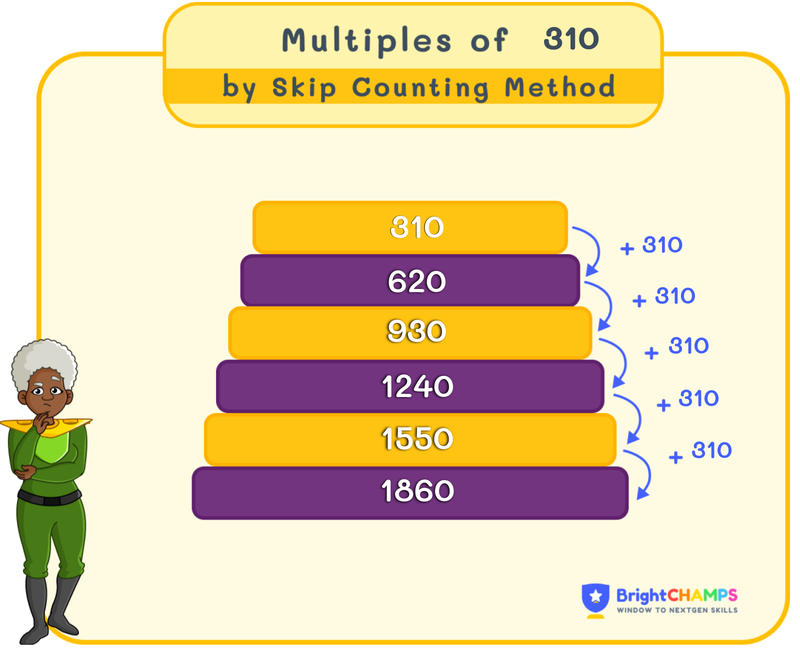
 145 Learners
145 LearnersLast updated on August 5, 2025

Multiples of 310

In math, multiples are the products we get while multiplying a number with other numbers. Multiples play a key role in construction and design, counting groups of items, sharing resources equally, and managing time effectively. In this topic, we will learn the essential concepts of multiples of 310.
What are the Multiples of 310?
Now, let us learn more about multiples of 310. Multiples of 310 are the numbers you get when you multiply 310 by any whole number, along with zero. Each number has an infinite number of multiples, including a multiple of itself.
In multiplication, a multiple of 310 can be denoted as 310 × n, where ‘n’ represents any whole number (0, 1, 2, 3,…). So, we can summarize that:
Multiple of a number = Number × Any whole number
For example, multiplying 310 × 1 will give us 310 as the product. Multiples of 310 will be larger or equal to 310.

List of First 20 Multiples of 310
Multiples of 310 include the products of 310 and an integer. Multiples of 310 are divisible by 310 evenly. The first few multiples of 310 are given below:
| TABLE OF 310 (1-10) | |
|---|---|
|
310 x 1 = 310 |
310 x 6 = 1860 |
|
310 x 2 = 620 |
310 x 7 = 2170 |
|
310 x 3 = 930 |
310 x 8 = 2480 |
|
310 x 4 = 1240 |
310 x 9 = 2790 |
|
310 x 5 = 1550 |
310 x 10 = 3100 |
| TABLE OF 310 (11-20) | |
|---|---|
|
310 x 11 = 3410 |
310 x 16 = 4960 |
|
310 x 12 = 3720 |
310 x 17 = 5270 |
|
310 x 13 = 4030 |
310 x 18 = 5580 |
|
310 x 14 = 4340 |
310 x 19 = 5890 |
|
310 x 15 = 4650 |
310 x 20 = 6200 |
Now, we know the first few multiples of 310. They are 0, 310, 620, 930, 1240, 1550, 1860, 2170, 2480, 2790, 3100,...
Operations with Multiples of 310
Understanding the multiples of 310 helps solve mathematical problems and boost our multiplication and division skills. When working with multiples of 310, we need to apply it to different mathematical operations such as addition, subtraction, multiplication, and division.
Sum of first 5 Multiples of 310:
310, 620, 930, 1240, and 1550 are the first five multiples of 310. When multiplying 310 from 1 to 5 we get these numbers as the products.
So, the sum of these multiples is:
310 + 620 + 930 + 1240 + 1550 = 4650
When we add the first 5 multiples of 310 the answer will be 4650.
Subtraction of first 5 Multiples of 310:
While we do subtraction, it improves our comprehension of how the value decreases when each multiple is subtracted from the previous one. 310, 620, 930, 1240, and 1550 are the first five multiples of 310. So, let us calculate it as given below:
310 - 620 = -310
-310 - 930 = -1240
-1240 - 1240 = -2480
-2480 - 1550 = -4030
Hence, the result of subtracting the first 5 multiples of 310 is -4030.
Average of first 5 Multiples of 310:
To calculate the average, we need to identify the sum of the first 5 multiples of 310, and then divide it by the count, i.e., 5. Because there are 5 multiples presented in the calculation. Averaging helps us to understand the concepts of central tendencies and other values. We know the sum of the first 5 multiples of 310 is 4650.
310 + 620 + 930 + 1240 + 1550 = 4650
Next, divide the sum by 5:
4650 ÷ 5 = 930
930 is the average of the first 5 multiples of 310.
Product of First 5 Multiples of 310:
The product of given numbers is the result of multiplying all of them together. Here, the first 5 multiples of 310 include: 310, 620, 930, 1240, and 1550. Now, the product of these numbers is:
310 × 620 × 930 × 1240 × 1550 = 353,584,200,000
The product of the first 5 multiples of 310 is 353,584,200,000.
Division of First 5 Multiples of 310:
While we perform division, we get to know how many times 310 can fit into each of the given multiples. 310, 620, 930, 1240, and 1550 are the first 5 multiples of 310.
310 ÷ 310 = 1
620 ÷ 310 = 2
930 ÷ 310 = 3
1240 ÷ 310 = 4
1550 ÷ 310 = 5
The results of dividing the first 5 multiples of 310 are: 1, 2, 3, 4, and 5.

Common Mistakes and How to Avoid Them in Multiples of 310
While working with multiples of 310, we make common mistakes. Identifying these errors and understanding how to avoid them can be helpful. Below are some frequent mistakes and tips to avoid them:

Multiples of 310 Examples

Problem 1
A factory produces toy cars in batches. Each batch contains 310 toy cars. If the factory produces four batches per week, how many toy cars will be produced in three weeks?

3,720 toy cars
Explanation
To find the total number of toy cars produced in three weeks, we multiply the number of toy cars per batch by the number of batches per week and then by the number of weeks
Toy cars per batch = 310
Batches per week = 4
Number of weeks = 3
310 × 4 × 3 = 3,720
Therefore, 3,720 toy cars will be produced in three weeks.

Problem 2
A library organizes its collection into sections, with each section containing books in multiples of 310. The first section has 310 books, the second has 620 books, and the third has 930 books. How many books are there in total across these three sections?

1,860 books
Explanation
We need to add up the books in each section:
First section: 310 books
Second section: 620 books
Third section: 930 books
310 + 620 + 930 = 1,860
So, there are 1,860 books in total across the three sections.

Problem 3
A shipping company uses containers that can each hold 310 packages. If the company fills 10 containers in a day, how many packages are shipped in a week?

21,700 packages
Explanation
To find the total number of packages shipped in a week, multiply the number of packages per container by the number of containers filled per day and then by the number of days in a week (7).
Packages per container = 310
Containers per day = 10
Number of days in a week = 7
310 × 10 × 7 = 21,700
Therefore, 21,700 packages are shipped in a week.

Problem 4
A tech company is assembling computer units. Each unit consists of 310 components. If they assemble 5 complete units each day, how many components are used in total after 6 days?

9,300 components
Explanation
Multiply the number of components per unit by the number of units assembled per day and then by the number of days.
Components per unit = 310
Units assembled per day = 5
Number of days = 6
310 × 5 × 6 = 9,300
So, 9,300 components are used in total after 6 days.

Problem 5
During a promotional event, a store gives out gift cards in multiples of 310 points. The first customer receives a card with 310 points, the second with 620 points, and the third with 930 points. What is the total number of points given out to these three customers?

1,860 points
Explanation
Add the points from each gift card:
First customer: 310 points
Second customer: 620 points
Third customer: 930 points
310 + 620 + 930 = 1,860
Therefore, a total of 1,860 points are given out to the three customers.


FAQs on Multiples of 310
1.How do you find the multiples of 310?
2.What is the LCM of 7 and 310?
3.What are the real-life applications of Multiples of 310?
4.Are multiples of 310 finite or infinite?
5.Is there any odd multiple of 310?
6.How can poems help children in Philippines memorize the Multiplication Table and Multiples of 310?
7.Can learning the Multiplication Table influence creativity in solving Multiples of 310 challenges for kids in Philippines?
8.How do language and cultural differences in Philippines affect the way children learn the Multiplication Table and Multiples of 310?
9.What role does brain development play in mastering the Multiplication Table and Multiples of 310 among early learners in Philippines?
Important Glossaries for Multiples of 310
- Multiple: A multiple represents the product of a number that may be multiplied by an integer. For example, multiples of 310 include 310, 620, 930, 1240, etc.
- Number pattern: This refers to how numbers are listed. It should follow a certain sequence. Multiples of 310 are the numbers that consist of the number pattern of 310.
- Even number: An even number refers to any number that can be divisible by 2 without leaving any remainder. The last digits of even numbers are 0, 2, 4, 6, or 8. Most multiples of 310 are even numbers.
- Divisor: It refers to any number by which another number can be divided without leaving any remainder. 1, 2, 5, 31, 62, 155, and 310 are some divisors of 310.
- LCM (Least Common Multiple): The smallest multiple shared by two or more numbers. For example, the LCM of 7 and 310 is 2170.
Explore More multiplication-tables
![Important Math Links Icon]() Previous to Multiples of 310
Previous to Multiples of 310
![Important Math Links Icon]() Next to Multiples of 310
Next to Multiples of 310
About BrightChamps in Philippines


Seyed Ali Fathima S
About the Author
Seyed Ali Fathima S a math expert with nearly 5 years of experience as a math teacher. From an engineer to a math teacher, shows her passion for math and teaching. She is a calculator queen, who loves tables and she turns tables to puzzles and songs.
Fun Fact
: She has songs for each table which helps her to remember the tables




